Man arrested near U.S. Capitol had truckload of weapons

An Alabama man arrested near the U.S. Capitol after the rioting had a truckload of weapons, including components for 11 explosive devices, guns, smoke devices, and machetes, along with a note containing information about a member of Congress, prosecutors wrote in court documents Tuesday. Federal prosecutors wrote that the note and volume of weapons Lonnie Leroy Coffman, 70, had in his truck suggest he had “an intent to provide them to others” and to attack members of Congress. Coffman was charged with multiple firearms crimes. “This is a defendant with access to firearms and numerous other lethal weapons, dangerous incendiary mixtures creating napalm, who appears to have been motivated to conduct violence against our elected representatives, prosecutors wrote in a motion asking for Coffman to remained jailed until trial. The note in the truck referred to a judge appointed by then-president Barack Obama as a “bad guy” and gave the name of a member of Congress, noting the representative is of Muslim faith. “The defendant brought these weapons to the immediate vicinity of the U.S. Capitol Building and traveled the area with two firearms on his person. The amount of weapons suggests an intent to provide them to others, as no one person could reasonably use so many at once,” prosecutors wrote. Coffman, who is from Falkville, was arrested the evening of Jan. 6, after a riot in the U.S. Capitol by a mob backing President Donald Trump. The breach of the Capitol followed a rally earlier in the day in which the president spoke. Prosecutors said Coffman left his truck in the morning that day of chaos and rioting and was arrested when he returned to the truck in the evening. Law enforcement officers said they swept the area after pipe bombs were found near two buildings. “The defendant told law enforcement that he had been trying to get back to the pickup truck throughout the day, but that he was turned away in light of the explosives investigations,” prosecutors wrote. Another Alabama man, who was out on bond on drug charges, was taken into custody Monday after being accused of participating in last week’s riot. Court records show that a judge on Monday revoked the bond for 23-year-old William Watson after prosecutors said he was identified in photographs and video of the riot. “Video surveillance from inside the Capital Building recorded images of protestors inside the building, including images of the Defendant dressed in a yellow sweatshirt standing next to a man with a horned hat. The Defendant was identified by local authorities,” prosecutors wrote in a motion. The FBI released the image of the bearded man in the yellow sweatshirt among photos of rioters they were hoping to identify. WRBL reported that Watson was arrested Monday afternoon in Auburn. Lee County Sheriff Jay Jones said Watson is in the county jail after having his bond revoked. He does not have any federal charges at this time, according to a search of court records. Authorities noted that they were also able to identify Watson by the distinctive tattoos on his hand and that Watson himself appeared to describe his participation in a social media post. “They wanna call me antifa because I have a video game tattoo on my hand and I was pleading for peaceful discourse. Let em say what they will. The fake news won’t win against thousands of patriots who recorded today,” read a social media post that prosecutors attributed to Watson. Republished with the permission of the Associated Press.
Raphael Warnock, Jon Ossoff win in Georgia, handing Dems Senate control
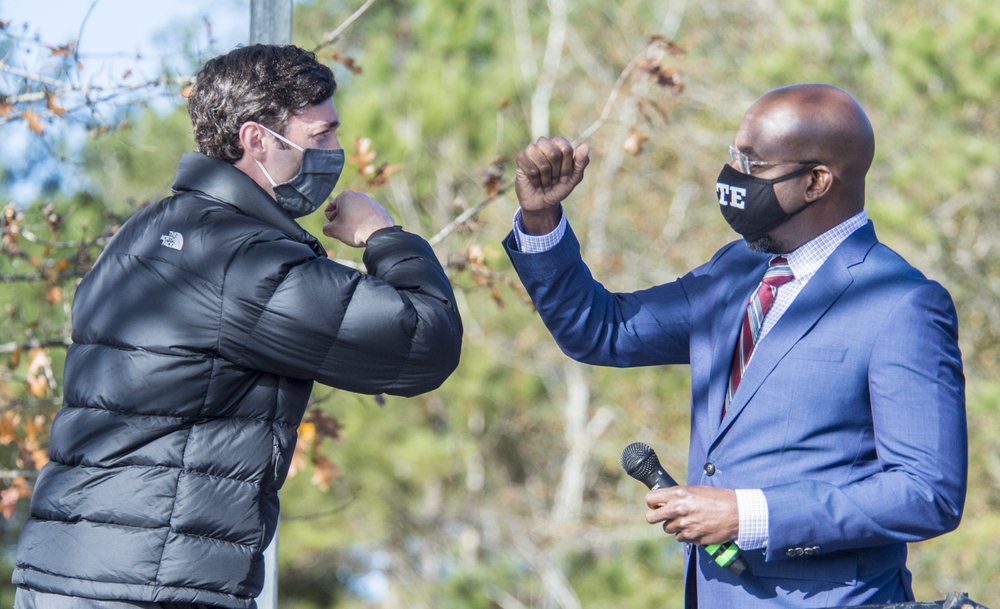
Democrats won both Georgia Senate seats — and with them, the U.S. Senate majority — as final votes were counted Wednesday, serving President Donald Trump a stunning defeat in his turbulent final days in office while dramatically improving the fate of President-elect Joe Biden’s progressive agenda. Jon Ossoff and Raphael Warnock, Democratic challengers who represented the diversity of their party’s evolving coalition, defeated Republicans David Perdue and Kelly Loeffler two months after Biden became the first Democratic presidential candidate to carry the state since 1992. Warnock, who served as pastor for the same Atlanta church where civil rights leader the Rev. Martin Luther King Jr. preached, becomes the first African American from Georgia elected to the Senate. And Ossoff becomes the state’s first Jewish senator and, at 33 years old, the Senate’s youngest member. This week’s elections were expected to mark the formal finale to the tempestuous 2020 election season, although the Democrats’ resounding success was overshadowed by chaos and violence in Washington, where angry Trump supporters stormed the U.S. Capitol to stop Congress from certifying Biden’s victory. Wednesday’s unprecedented siege drew fierce criticism of Trump’s leadership from within his own party, and combined with the bad day in Georgia, marked one of the darkest days of his divisive presidency. Still, the Democrats’ twin victories in Georgia represented a striking shift in the state’s politics as the swelling number of diverse, college-educated voters flex their power in the heart of the Deep South. They also cemented the transformation of Georgia, once a solidly Republican state, into one of the nation’s premier battlegrounds for the foreseeable future. In an emotional address early Wednesday, Warnock vowed to work for all Georgians whether they voted for him or not, citing his personal experience with the American dream. His mother, he said, used to pick “somebody else’s cotton” as a teenager. “The other day, because this is America, the 82-year-old hands that used to pick somebody else’s cotton picked her youngest son to be a United States senator,” he said. “Tonight, we proved with hope, hard work and the people by our side, anything is possible.” Loeffler, who remains a senator until the results of Tuesday’s election are finalized, returned to Washington on Wednesday morning to join a small group of senators planning to challenge Congress’ vote to certify Biden’s victory. She didn’t get a chance to vocalize her objection before the violent protesters stormed the Capitol. Georgia’s other runoff election pitted Perdue, a 71-year-old former business executive who held his Senate seat until his term expired Sunday, against Ossoff, a former congressional aide and journalist. “This campaign has been about health and jobs and justice for the people of this state — for all the people of this state,” Ossoff said in a speech broadcast on social media Wednesday morning. “Whether you were for me, or against me, I’ll be for you in the U.S. Senate. I will serve all the people of the state.” Trump’s false claims of voter fraud cast a dark shadow over the runoff elections, which were held only because no candidate hit the 50% threshold in the general election. He raised the prospect of voter fraud as votes were being cast and likened the Republicans who run Georgia’s election system to “chickens with their heads cut off” during a Wednesday rally in Washington. Gabriel Sterling, a top official with the Georgia secretary of state’s office and a Republican, said there was “no evidence of any irregularities.” “The biggest thing we’ve seen is from the president’s fertile mind of finding fraud where none exists,” he said. Both contests tested whether the political coalition that fueled Biden’s November victory was an anti-Trump anomaly or part of a new electoral landscape. To win in Tuesday’s elections — and in the future — Democrats needed strong African American support. AP VoteCast, a survey of more than 3,700 voters in Tuesday’s contests, found that Black voters made up roughly 30% of the electorate, and almost all of them — 94% — backed Ossoff and Warnock. The Democrats also relied on the backing of younger voters, people earning less than $50,000 annually, and newcomers to the state. The Republican coalition backing Loeffler and Perdue was the mirror opposite: white, older, wealthier, and longtime Georgia residents. The coalition closely resembles the one that narrowly handed Georgia’s Electoral College votes to Biden in November, making him the first Democratic presidential candidate to win the state in almost three decades. Trump’s claims about voter fraud in the 2020 election, while meritless, resonated with Republican voters in Georgia. About 7 in 10 agreed with his false assertion that Biden was not the legitimately elected president, AP VoteCast found. Election officials across the country, including the Republican governors in Arizona and Georgia, as well as Trump’s former attorney general, William Barr, have confirmed that there was no widespread fraud in the November election. Nearly all the legal challenges from Trump and his allies have been dismissed by judges, including two tossed by the Supreme Court, where three Trump-nominated justices preside. Publicly and privately, some Republicans acknowledged that Trump’s monthslong push to undermine the integrity of the nation’s electoral system may have contributed to the GOP’s losses in Georgia. “It turns out that telling the voters that the election was rigged is not a great way to turn out your voters,” said Utah Sen. Mitt Romney, a Republican and a frequent Trump critic. Even with Trump’s claims, voters in both parties were drawn to the polls because of the high stakes. AP VoteCast found that 6 in 10 Georgia voters say Senate party control was the most important factor in their vote. Turnout exceeded both sides’ expectations. Ultimately, more people cast ballots in the runoffs than voted in Georgia’s 2016 presidential election. Former President Barack Obama, the nation’s first Black president, issued a statement praising the election of Georgia’s first African American senator and his ability to improve divisions in Washington. “Georgia’s first Black senator will make the (Senate)
Joe Biden’s attorney general search is focused on Doug Jones, Merrick Garland

Alabama Sen. Doug Jones and federal appeals court judge Merrick Garland are emerging as the leading contenders to be nominated as President-elect Joe Biden’s attorney general, three people familiar with the matter told The Associated Press. A decision hasn’t been finalized and the dynamics could shift in the coming days as Biden builds out his Cabinet with an eye to ensuring diverse leadership in the top ranks of his administration. But Jones, who lost reelection last month, and Garland, whose Supreme Court nomination was snubbed by Republicans, appear increasingly well-positioned ahead of other rivals. Democrats are particularly concerned about the prospect of Biden nominating former Deputy Attorney General Sally Yates, fearing she could face a difficult confirmation in the Senate because of her role in issues related to the Russia investigation. Biden’s thinking was described by people with knowledge of the presidential transition’s internal thinking who were not authorized to speak publicly. Andrew Bates, a representative for the transition, did not comment for this story. The president-elect is facing pressure to ensure that Black and Latino leaders are prominently positioned in his administration. He selected retired Army Gen. Lloyd Austin this week to become the first Black secretary of defense. Jones, who is white, has had a long-standing personal relationship with Biden dating back to Biden’s first presidential campaign in 1988. The former U.S. attorney prosecuted members of the Ku Klux Klan who were responsible for a 1963 church bombing in Birmingham, Alabama, and later served as the U.S. attorney there from 1997 until 2001. Biden met with civil rights activists on Tuesday to discuss diversity in his Cabinet. The Rev. Al Sharpton, who attended the meeting, encouraged Biden to select a Black attorney general but gave him room to select someone of another race as long as they had a background in civil rights. “I said the least we could have is someone that has a proven civil rights background that’s someone that’s going to handle this heightened racist bigoted atmosphere,” Sharpton told reporters. It’s unclear whether Garland would fit that standard as easily. He is an experienced judge with a reputation for moderation who held senior positions at the Justice Department decades ago, including as a supervisor of the prosecution of the 1995 Oklahoma City bombing. Garland was put forward by President Barack Obama for a seat on the Supreme Court in 2016 following the death of Justice Antonin Scalia, but Republicans refused to hold hearings in the final year of Obama’s term. The vacancy was later filled by Justice Neil Gorsuch during the Trump administration. The incoming attorney general would inherit a Justice Department that has endured a tumultuous four years and would likely need to focus on not only civil rights issues and an overhaul of national policing policies after months of mass protests over the deaths of Black Americans at the hand of law enforcement, but also on concerns from Democrats about politicization of the department in the Trump administration. Biden has said he will not be involved in Justice Department investigative decisions even as some Democrats have openly wished for probes into President Donald Trump and his associates after he leaves office. Supporters of Yates view her nearly 30-year Justice Department career in both Democratic and Republican administrations, and experience ranging from civil rights cases to national security matters, as making her uniquely qualified to lead the department as it looks to move on from the Trump era. Still, Republican senators would be likely to focus a Yates confirmation hearing on her final year at the department, when the FBI closed out the Hillary Clinton email investigation and opened an investigation into whether the Trump campaign was coordinating with Russia, which later morphed into special counsel Robert Mueller’s investigation. Yates has repeatedly discussed both, including before the Senate committee that has oversight of the confirmation process. She has made clear that she disagreed with the way the FBI conducted some of the most heavily scrutinized actions of both investigations, including the decision to hold a press conference about the Clinton probe and then to alert Congress days before the election that it had been reopened. Even so, Republicans would nonetheless press Yates on problems with the Russia probe that were revealed by a Justice Department inspector general investigation, including errors and omissions in applications to surveil a former Trump campaign aide, and about how she would handle a special counsel inquiry focused on the FBI’s actions in that case. Yates has said that she would not have signed off on the surveillance had she known of the problems in the applications. But the appointment of John Durham as a special counsel to review the Russia probe suggests the inquiry is likely to endure into the Biden administration, creating a backward-looking focus for a new attorney general just as Yates would try to turn the page from the issue. Jones would not comment Tuesday on the possibility of a nomination as attorney general. “They have a process and we’ll let that process play,” he told reporters on Capitol Hill. The Biden team has also been considering a number of other potential candidates for the post, including former Justice Department official Lisa Monaco. Republished with the permission of the Associated Press.
Joe Biden eyes defeated candidates for key administration roles

In politics, there can sometimes be an upside to losing. President-elect Joe Biden is eyeing several Democrats who lost congressional reelection races last month for key positions in his administration. They include outgoing Reps. Abby Finkenauer of Iowa, Donna Shalala of Florida, and Sen. Doug Jones of Alabama. Their consideration continues a long Washington tradition of defeated politicians seeking shelter in a new White House. Landing a job in a new administration can both position the losing candidates for future campaigns and provide the incoming president with important relationships on Capitol Hill. “It’s good to have people who know how to roam the halls of Congress,” said Andrew Card, who directed George W. Bush’s transition and later served as the Republican president’s chief of staff. Biden’s transition team declined to comment on the prospects of any individual contender for an administration role. He has already unveiled much of his economic and national security team and is expected to announce picks soon for key health positions. But there are still a large number of major Cabinet positions to be filled, including attorney general and leaders of the departments of Labor, Commerce, and Transportation. As Biden considers his options, his personal connection with some of the defeated lawmakers could carry significance. Finkenauer, who is under consideration as Labor secretary, owes her start in politics in part to Biden. As a college student, she worked on his ill-fated 2008 presidential campaign. A decade later, he headlined a rally for her winning congressional campaign. She was a key surrogate for Biden ahead of the Iowa caucuses. “I know they have a long relationship, and it’s been mutually supportive,” said former Assistant Dubuque City Manager Teri Goodman, who is a decades-long Biden supporter and has watched Finkenauer’s rise. Finkenauer narrowly lost her bid for a second term in a rural northeast Iowa district. But since then, the former state legislator, who made a name promoting public employee unions, has had conversations with senior Biden transition officials about leading the Labor Department, according to Democratic sources familiar with the communications. Jones, meanwhile, is in the mix to lead the Justice Department, partly due to his work as a U.S. attorney who helped convict Ku Klux Klansmen for the Birmingham church bombing that killed four Black girls. He narrowly won a special Alabama Senate election in 2017 but lost reelection last month. He also has a longstanding personal relationship with Biden, dating to Biden’s first presidential campaign in 1988. Biden spoke at Jones’ campaign kickoff in 2017, saying of Jones, “He knows your heart and will never let you down,” and was the first to telephone him on Nov. 3 after he’d lost the seat to Republican Tommy Tuberville. Shalala is perhaps the most administration-ready of 2020′s losing Democratic class. She spent eight years as secretary of health and human services under Bill Clinton and then served as president of the University of Miami before winning a south Florida House seat in 2018. She has heard from Biden transition officials. Beyond the outgoing members of Congress, Biden is also considering his former rivals in the Democratic primary for jobs. He already tapped California Sen. Kamala Harris as his vice president. Biden is weighing roles for Pete Buttigieg, the former South Bend, Indiana mayor who mounted a surprisingly strong campaign in the early stretch of the Democratic primaries. Biden has expressed deep affection for Buttigieg, who was one of the first major candidates to drop out of the race and endorse Biden. Montana Gov. Steve Bullock, who lost his Senate bid after leaving the White House race, is part of discussions for a Biden administration role, perhaps as secretary of agriculture. Another name under consideration for agriculture is former North Dakota Sen. Heidi Heitkamp, who lost in 2018 but has been a champion of reinvigorating rural America. “If they think I can be helpful, then good,” Heitkamp told The Associated Press recently. Presidents have often sought losing rivals for positions. Republican Donald Trump chose fellow 2016 GOP presidential candidates Rick Perry as energy secretary and Ben Carson for housing and urban development. Democrat Barack Obama notably chose former rival Hillary Clinton to be secretary of state after the 2008 election. Missouri Sen. John Ashcroft’s defeat in 2000 paved the way for his four years as attorney general under George W. Bush, including during the aftermath of the 2001 terrorist attacks in the United States. Former Senate Majority Leader Tom Daschle of South Dakota, who lost the election to a third term in 2004, was tapped after the 2008 election by Obama to head health and human services, which would have put him at the forefront of the health care debate. Daschle withdrew from consideration after questions arose about his failure to properly report and pay income taxes. The most successful losing congressional candidate of the past 50 years is George H. W. Bush, who as a two-term Republican U.S. House member from Texas lost his 1970 bid for Senate against Democrat Lloyd Bentsen. As a consolation, President Richard Nixon picked Bush to be ambassador to the United Nations, a disappointment for the up-and-comer who was hoping for a treasury job. But the post led to an ambassadorship to China, and the experiences were valuable when as president he found himself leading a global coalition in Operation Desert Storm. “The significance is that was the beginning of his self schooling and expertise in foreign affairs,” said Chase Untermeyer, director of White House personnel during George H. W. Bush’s administration. In a White House led by a Capitol Hill veteran like Biden, a team with a background in Congress is particularly valuable to those around the president, since Biden remains well acquainted with the rules and many members. But considering Biden hasn’t been a senator in nearly a dozen years, Card said those with more recent experience in Congress will be helpful. “More than helping the president, these people can help the White House staff dealing with members of Congress,” said Card. “They know where
Among first acts, Joe Biden to call for 100 days of mask-wearing
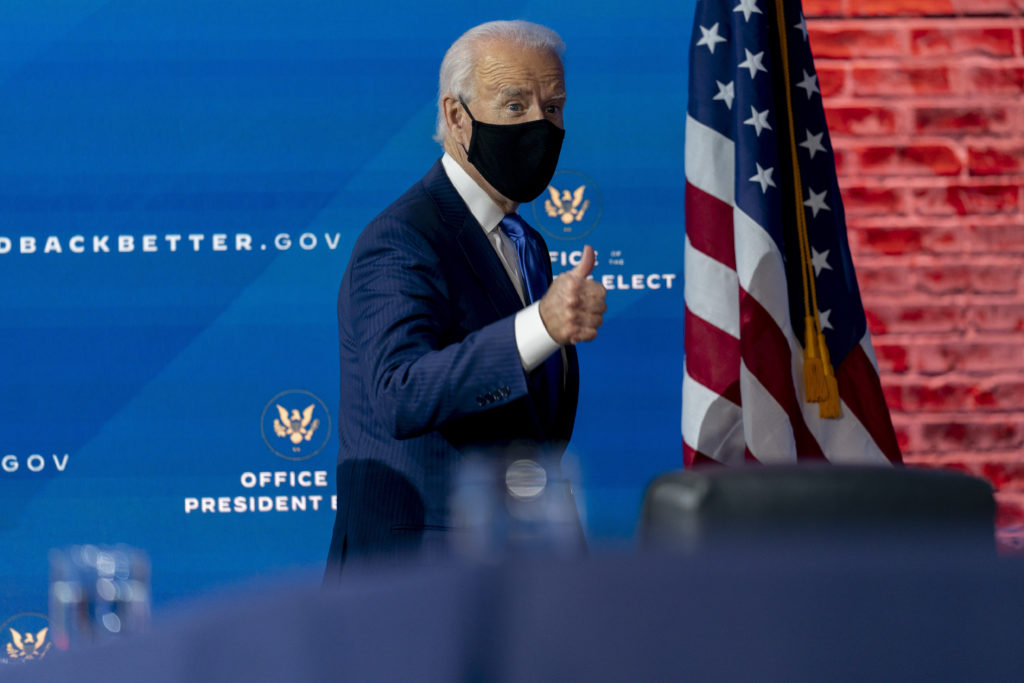
Joe Biden said Thursday that he will ask Americans to commit to 100 days of wearing masks as one of his first acts as president, stopping just short of the nationwide mandate he’s pushed before to stop the spread of the coronavirus. The move marks a notable shift from President Donald Trump, whose own skepticism of mask-wearing has contributed to a politicization of the issue. That’s made many people reticent to embrace a practice that public health experts say is one of the easiest ways to manage the pandemic, which has killed more than 275,000 Americans. The president-elect has frequently emphasized mask-wearing as a “patriotic duty” and during the campaign floated the idea of instituting a nationwide mask mandate, which he later acknowledged would be beyond the ability of the president to enforce. Speaking with CNN’s Jake Tapper, Biden said he would make the request of Americans on Inauguration Day, Jan. 20. “On the first day I’m inaugurated, I’m going to ask the public for 100 days to mask. Just 100 days to mask — not forever, just 100 days. And I think we’ll see a significant reduction” in the virus, Biden said. Biden also said he asked Dr. Anthony Fauci to stay on in his administration, “in the exact same role he’s had for the past several presidents,” as the director of the National Institute of Allergy and Infectious Diseases, the nation’s top infectious-disease expert. The president-elect said he’s asked Fauci to be a “chief medical adviser” as well as part of his COVID-19 advisory team. Regarding a coronavirus vaccine, Biden said he’d be “happy” to get inoculated in public to assuage any concerns about its efficacy and safety. Three former presidents — Barack Obama, George W. Bush, and Bill Clinton — have said they’d also get vaccinated publicly to show that it’s safe. “People have lost faith in the ability of the vaccine to work,” Biden said, adding that “it matters what a president and the vice president do.” In the same interview, Biden also weighed in on reports that Trump is considering pardons of himself and his allies. “It concerns me in terms of what kind of precedent it sets and how the rest of the world looks at us as a nation of laws and justice,” Biden said. Biden committed that his Justice Department will “operate independently” and that whoever he chooses to lead the department will have the “independent capacity to decide who gets investigated.” “You’re not going to see in our administration that kind of approach to pardons, nor are you going to see in our administration the approach to making policy by tweets,” he said. Vice President-elect Kamala Harris added that any decision coming out of the Department of Justice “should be based on facts, should be based on the law — it should not be influenced by politics.” Republished with the permission of the Associated Press.
Joe Biden chooses an all-female senior White House press team
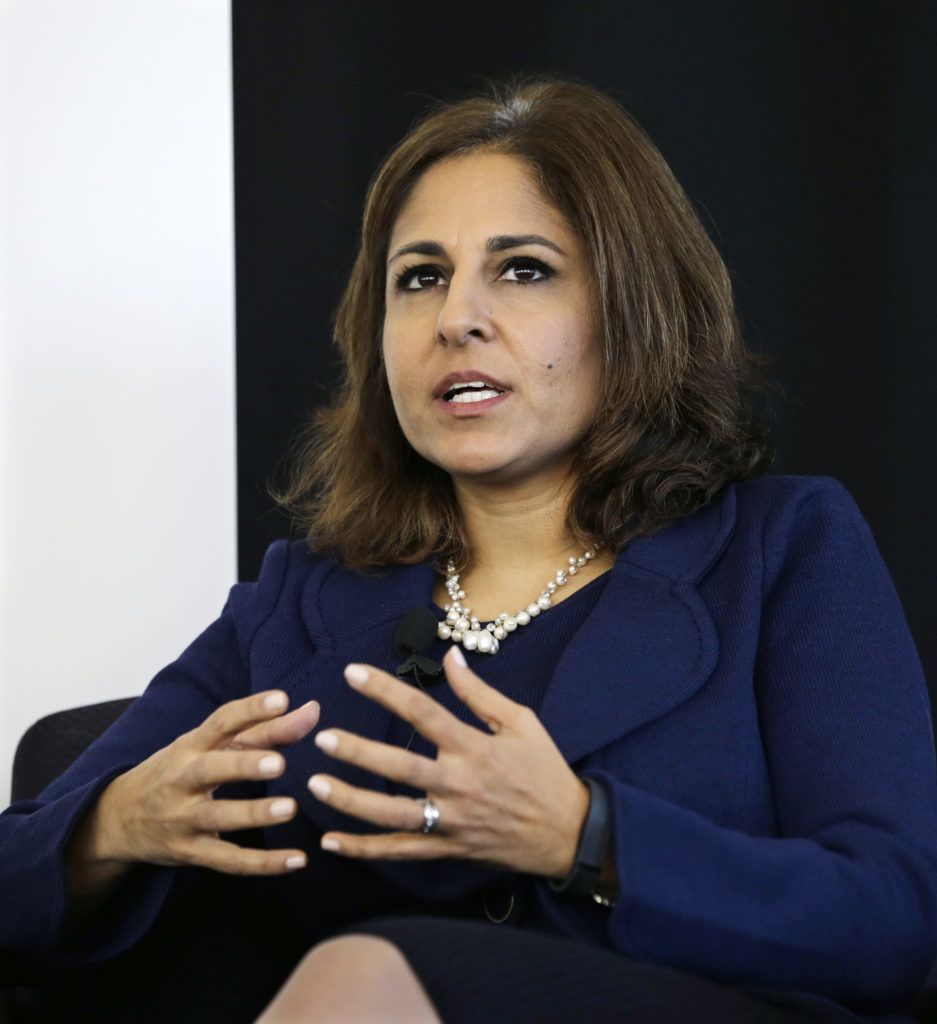
President-elect Joe Biden will have an all-female senior communications team at his White House, reflecting his stated desire to build out a diverse White House team as well as what’s expected to be a return to a more traditional press operation. Biden campaign communications director Kate Bedingfield will serve as Biden’s White House communications director. Jen Psaki, a longtime Democratic spokeswoman, will be his press secretary. In a different area of the White House operation, Biden plans to name Neera Tanden, the president and CEO of the liberal think tank Center for American Progress, as director of the Office of Management and Budget, according to a person familiar with the transition process granted anonymity to speak freely about internal deliberations. Four of the seven top communications roles at the White House will be filled by women of color, and it’s the first time the entire senior White House communications team will be entirely female. President Donald Trump upended the ways in which his administration communicated with the press. In contrast with administrations past, Trump’s communications team held few press briefings, and those that did occur were often combative affairs riddled with inaccuracies and falsehoods. Trump himself sometimes served as his own press secretary, taking questions from the media, and he often bypassed the White House press corps entirely by dialing into his favorite Fox News shows. In a statement announcing the White House communications team, Biden said: “Communicating directly and truthfully to the American people is one of the most important duties of a President, and this team will be entrusted with the tremendous responsibility of connecting the American people to the White House.” He added: “These qualified, experienced communicators bring diverse perspectives to their work and a shared commitment to building this country back better.” Bedingfield, Psaki and Tanden are all veterans of the Obama administration. Bedingfield served as communications director for Biden while he was vice president; Psaki was a White House communications director and a spokesperson at the State Department; and Tanden served as a senior adviser to Health and Human Services Secretary Kathleen Sebelius and helped craft the Affordable Care Act. Others joining the White House communications staff are: — Karine Jean Pierre, who was Vice President-elect Kamala Harris’ chief of staff, will serve as a principal deputy press secretary for the president-elect. She’s another Obama administration alum, having served as a regional political director for the White House office of political affairs. — Pili Tobar, who was communications director for coalitions on Biden’s campaign, will be his deputy White House communications director. She most recently was deputy director for America’s Voice, an immigration reform advocacy group, and was a press staffer for Senate Minority Leader Chuck Schumer, D-N.Y. Three Biden campaign senior advisers are being appointed to top communications roles: — Ashley Etienne, a former communications director for House Speaker Nancy Pelosi, will serve as Harris’ communications director. — Symone Sanders, another senior adviser on the Biden campaign, will be Harris’ senior adviser and chief spokesperson. — Elizabeth Alexander, who served as the former vice president’s press secretary and his communications director while he was a U.S. senator from Delaware, will serve as Jill Biden’s communications director. After his campaign went virtual due to the coronavirus pandemic, Biden faced some of his own criticism for not being accessible to reporters. But near the end of the campaign, he answered questions from the press more frequently, and his transition team has held weekly briefings since he was elected president. The choice of a number of Obama administration veterans — many with deep relationships with the Washington press corps — also suggests a return to a more congenial relationship with the press. As head of the OMB, Tanden would be responsible for preparing Biden’s budget submission and would command several hundred budget analysts, economists and policy advisers with deep knowledge of the inner workings of the government. Her choice may mollify progressives, who have been putting pressure on Biden to show his commitment to progressive priorities with his early staff appointments. She was chosen over more moderate voices with roots in the party’s anti-deficit wing such as Bruce Reed, who was staff director of President Barack Obama’s 2010 deficit commission, which proposed a set of politically painful recommendations that were never acted upon. Republished with the permission of the Associated Press.
Donald Trump ‘ashamed’ to have endorsed Republican Georgia governor
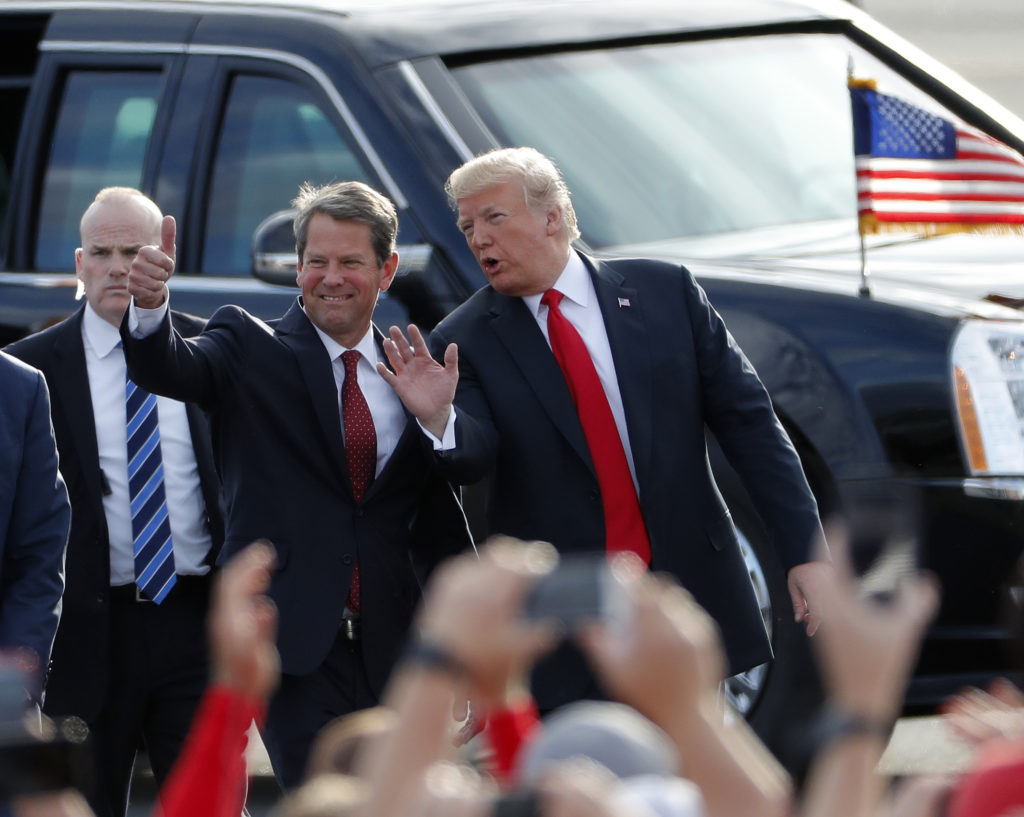
President Donald Trump said Sunday he was “ashamed” for endorsing the Republican governor of Georgia after he lost in the state to Democrat Joe Biden. Trump has seethed over losing the southern state, which hadn’t voted for a Democrat for president in nearly 30 years. In January, the state will decide whether the GOP retains control of the U.S. Senate when voters decide two run-off Senate races. Trump said on Fox News that Gov. Brian Kemp has “done absolutely nothing” to question the state’s results. Trump has made baseless accusations that illegal votes cost him the election in Georgia and beyond. His legal challenges have failed in several states. Trump backed Kemp’s campaign in 2018, boasting that his “full endorsement” helped him edge rising Democrat Stacey Abrams. In this month’s presidential contest, Biden beat Trump by about 12,670 votes. Democrats hope for two other upset victories in twin Senate races on Jan. 5 against Republican office holders. That would deny Republicans their majority, keeping the GOP with 50 seats, while Vice President-elect Kamala Harris would be available for tie-breaking votes. Democrat Jon Ossoff is challenging Sen. David Perdue while Rev. Raphael Warnock takes on Sen. Kelly Loeffler. No candidate won at least 50% of the vote share in this month’s election, leading to the head-to-head runoffs. Ossoff said Sunday that a Republican-controlled Senate will hit the Biden administration with the same “obstructionism” it mounted against former President Barack Obama. “It will be paralysis, partisan trench warfare,” he told CNN. “At a moment of crisis, when we need strong action.” Loeffler on Fox News said GOP victories would be a “firewall to socialism” and the Democratic policies of Senate Minority Leader Chuck Schumer. It is Loeffler’s first election cycle after Gov. Kemp appointed her to the seat in January when her predecessor resigned. Trump on Saturday plans to arrive in the state he lost to campaign for the GOP incumbents. “We’re making sure that Georgians are fired up to turn out to vote,” Loeffler said. “If we vote, we will win this election.” Republished with the permission of the Associated Press.
Bruce Boynton, who inspired 1961 Freedom Rides, dies at 83
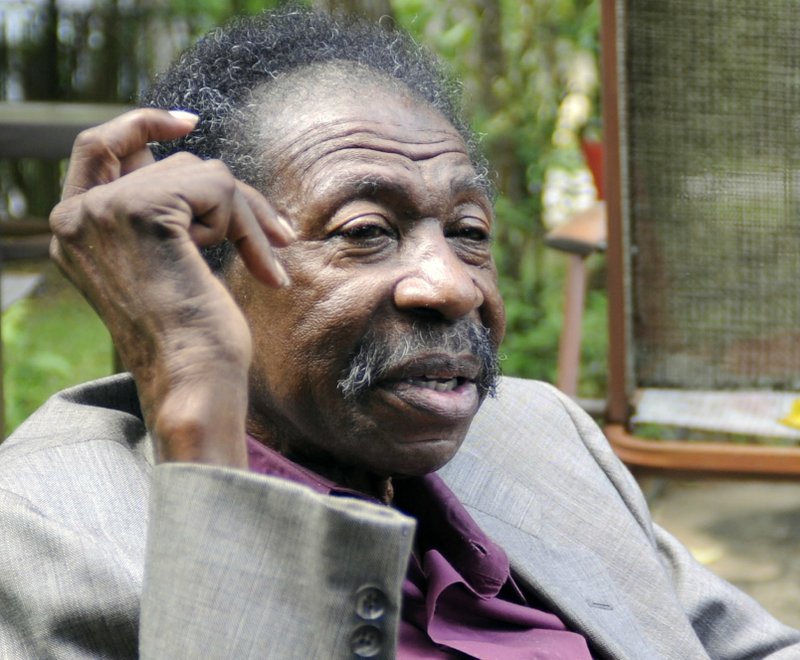
Bruce Carver Boynton, a civil rights pioneer from Alabama who inspired the landmark “Freedom Rides” of 1961, has died. He was 83. Former Alabama state Sen. Hank Sanders, a friend of Boynton’s, confirmed his passing Friday. Boynton was arrested 60 years ago for entering the white part of a racially segregated bus station in Virginia and launching a chain reaction that ultimately helped to bring about the abolition of Jim Crow laws in the South. Boynton contested his conviction, and his appeal resulted in a U.S. Supreme Court decision that prohibited bus station segregation and helped inspire the “Freedom Rides.” Despite his pivotal role, Boynton was not as well known as other civil rights figures. Yet both his mother and father were early civil rights activists. His mother, Amelia Boynton Robinson, was savagely beaten while demonstrating for voting rights in 1965 and was honored by then-President Barack Obama 50 years later. “He did something that very few people would have the courage to do. He said no,” U.S. District Judge Myron Thompson said of Boynton in 2018. “To me, he’s on a par with Rosa Parks,” the Black woman who refused to give up her bus seat to a white man. Boynton described his arrest in a 2018 interview with The Associated Press. Boynton was attending law school at Howard University in Washington, D.C. when he boarded a bus bound for Alabama in 1958. Public facilities including bus stations were separated by race across the South at the time, despite federal laws banning segregation in interstate travel. The bus pulled into a station in Richmond, Virginia, for a break, and Boynton went inside to eat. Seeing that the part of the restaurant meant for blacks had water on the floor and looked “very unsanitary,” Boynton said he sat down in the “clinically clean” white area. He told the waitress he would have a cheeseburger and tea. “She left and came back with the manager. The manager poked his finger in my face and said … move,’” using a racial slur, Boynton recalled in the interview. “And I knew that I would not move, and I refused to, and that was the case.” Convicted of trespassing, Boynton appealed and his case wound up before the Supreme Court. Thurgood Marshall, then the nation’s leading civil rights attorney and later on to become the first Black Supreme Court justice, was his counsel. Boynton contested his conviction and the Supreme Court ruled in 1960 that federal discrimination prohibitions barring segregation on interstate buses also applied to bus stations and other facilities linked to interstate travel. The next year, dozens of black and white students set out on buses to travel the South and test whether the ruling in the case, Bruce Boynton v. Virginia, was being followed. The “Freedom Riders” were arrested or attacked in Alabama, Mississippi, and South Carolina, and a bus was burned. Then-President John F. Kennedy ordered stricter enforcement of federal anti-discrimination laws. “He was a pioneer,” said Sanders. “All of the Freedom Rides sprung from this particular action.” Sanders said Boynton paid a price for what he did, and initially wasn’t able to get a law license in Alabama. He spent most of his career as a civil rights attorney before retirement. Thompson said in 2018 that Boynton’s life “is a teaching lesson for all of us about how we can make a difference.” “All he wanted was a cheeseburger, and he changed the course of history.” Republished with the permission of the Associated Press.
Joe Biden filling top White House team with campaign veterans

President-elect Joe Biden announced a raft of top White House staff positions on Tuesday, drawing from the senior ranks of his campaign and some of his closest confidants to fill out an increasingly diverse White House leadership team. Biden confirmed that former campaign manager Jen O’Malley Dillon will serve as deputy chief of staff, while campaign co-chair Louisiana Rep. Cedric Richmond and campaign adviser Steve Ricchetti will hold senior roles in the new administration. Richmond will leave his Louisiana congressional seat to fill the White House job. The president-elect also announced that Mike Donilon, a longtime Biden confidant, will serve as a senior adviser; Dana Remus, the campaign’s current general counsel, will be counsel to the president; Julie Chavez Rodriguez, one of Biden’s deputy campaign managers, will serve as director of the White House Office of Intergovernmental Affairs; and Annie Tomasini, Biden’s current traveling chief of staff, will serve as the director of Oval Office operations. Anthony Bernal, who served as Jill Biden’s chief of staff on the campaign, will serve as a senior adviser to her, and Julissa Reynoso Pantaleon, a former Obama ambassador to Uruguay, will be her chief of staff. The new hires represent an initial wave of what will ultimately be hundreds of new White House aides hired in the coming weeks as Biden builds out an administration to execute his governing vision. The Democrat will be inaugurated Jan. 20. Late last week, Biden tapped former senior campaign adviser Ron Klain to serve as his chief of staff. The latest round reflects Biden’s stated commitment to diversity in his staff — the team includes four people of color and five women. “America faces great challenges, and they bring diverse perspectives and a shared commitment to tackling these challenges and emerging on the other side a stronger, more united nation,” Biden said in a statement. O’Malley Dillon, 44, was the first woman to manage a successful Democratic presidential campaign. She is a veteran political operative who worked on both of Barack Obama’s White House bids. Rodriguez, granddaughter of the late farmworker union leader César Chávez, was national political director on Sen. Kamala Harris’ 2016 presidential team before coming to the Biden campaign and served in the Obama administration. Richmond, a 47-year-old African American, will be a senior adviser to the president and director of the White House Office of Public Engagement, the role Valerie Jarrett filled in the Obama administration. He’s expected to engage with Congress and focus on the Black community and other minority groups. Richmond formally announced that he was taking the position at a news conference at a regional airport in eastern New Orleans, not far from his home. He said he will step down from his congressional post in January. Richmond said he believes having Biden’s ear in a West Wing office will enable him to help Louisiana and other Southern states with similar problems, including poverty, poor health outcomes, and ineffective education. “This new role will allow me to offer advice to the president when he wants it — maybe sometimes when he doesn’t want it,” Richmond said. A former chair of the Congressional Black Caucus, Richmond was among Biden’s earliest high-profile supporters and served as his campaign co-chair. Richetti, Donilon, Tomasini, and Bernal all have long-standing relationships with the Biden family. Ricchetti was Biden’s chief of staff during Obama’s second term, while Donilon has advised him in various roles since 1981, and Tomasini served in communications roles for Biden when he was still a senator. Bernal worked for Jill Biden during the 2008 Obama-Biden campaign and in various roles for her during both terms of the Obama administration. Less clear is the shape of Biden’s Cabinet, which will be subject to Senate confirmation. Since winning the election earlier this month, the president-elect has been hunkered down with Vice President-elect Harris near his home in Delaware preparing for the business of governing. Biden will begin rolling out his higher-profile Cabinet picks in the coming weeks. Republished with the permission of the Associated Press.
Donald Trump fires agency head who vouched for 2020 vote security
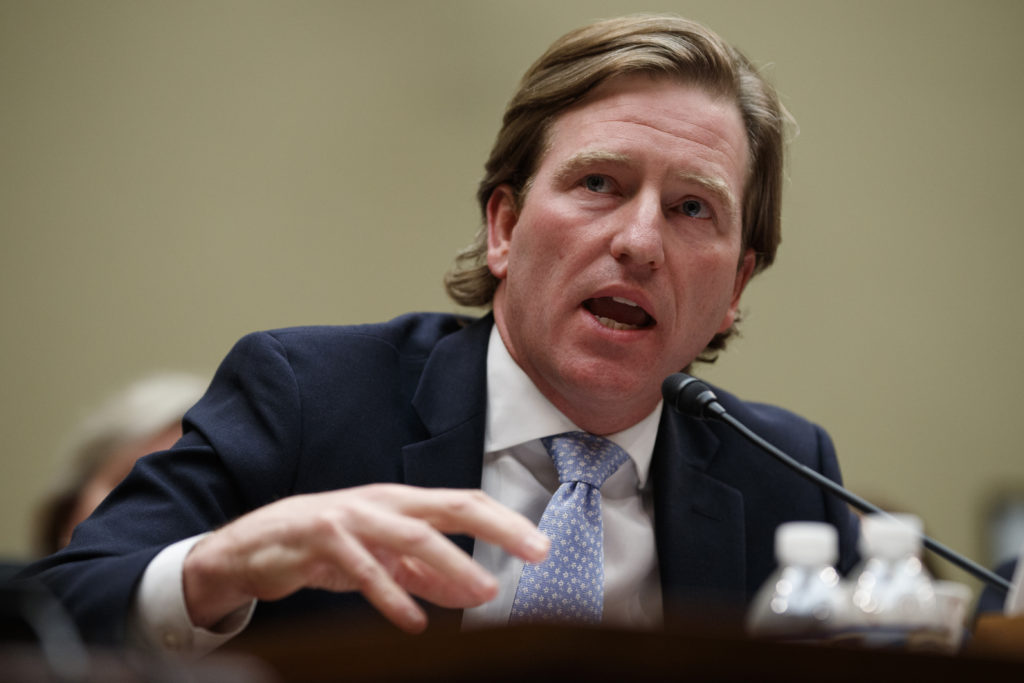
President Donald Trump on Tuesday fired the director of the federal agency that vouched for the reliability of the 2020 election. Trump fired Christopher Krebs in a tweet, saying his recent statement defending the security of the election was “highly inaccurate.” While abrupt, the dismissal was hardly surprising. Krebs, director of the Cybersecurity and Infrastructure Security Agency, had offered a stream of statements and tweets over the past week attesting to the integrity of the election, directly contradicting Trump’s false assertions of widespread fraud without mentioning the president by name. The firing of Krebs, a Trump appointee, comes as Trump is refusing to recognize the victory of Democratic President-elect Joe Biden and removing high-level officials seen as insufficiently loyal. He fired Defense Secretary Mark Esper on Nov. 9, part of a broader shakeup that put Trump loyalists in senior Pentagon positions. A former Microsoft executive, Krebs ran the agency, known as CISA, from its creation in the wake of Russian interference with the 2016 election through the November election. He won bipartisan praise as CISA coordinated federal state and local efforts to defend electoral systems from foreign or domestic interference. Krebs has repeatedly pushed back against false claims that the election was tainted. Earlier Tuesday, he tweeted out a report citing 59 election security experts saying there is no credible evidence of computer fraud in the 2020 election outcome. Trump fired back on Twitter later in the day. He repeated unsubstantiated claims about the vote and wrote “effective immediately, Chris Krebs has been terminated as Director of the Cybersecurity and Infrastructure Security Agency.” Krebs, from his personal Twitter account, responded: “Honored to serve. We did it right. Defend Today, Secure Tomorrow.” He closed with the phrase “Protect 2020,” which had been his agency’s slogan ahead of the election. Officials with CISA and its parent agency, the Department of Homeland Security, had no immediate comment. Rep. Adam Schiff, D-Calif., chairman of the House intelligence committee, assailed Trump for “retaliating against Director Krebs and other officials who did their duty. It’s pathetic but sadly predictable that upholding and protecting our democratic processes would be cause for firing.” Krebs kept a low profile even as he voiced confidence ahead of the November vote and, afterward, knocked down allegations that the count was tainted by fraud. The repudiation of Trump was notable coming from a component of DHS, which has been criticized for seeming to be too closely aligned with the president’s political goals. CISA issued statements dismissing claims that large numbers of dead people could vote or that someone could change results without detection. It also distributed a statement from a coalition of federal and state officials concluding there was no evidence that votes were compromised or altered in the Nov. 3 election and that the vote was the most secure in American history. Krebs avoided ever directly criticizing the president and tried to stay above the political fray, even as he worked to contradict misinformation coming from the president and his supporters. “It’s not our job to fact check the president,” he said at a briefing with reporters on the eve of the election. CISA works with the state and local officials who run U.S. elections as well as private companies that supply voting equipment to address cybersecurity and other threats while monitoring balloting and tabulation from a control room at its headquarters near Washington. It also works with industry and utilities to protect the nation’s industrial base and power grid from threats. The agency enjoys a good reputation among its core constituency — the state and local election officials who rely on its advice and services at a time of near-constant cyberattack — as well as on Capitol Hill, where lawmakers recently proposed an increase of its annual budget of around $2 billion. His removal is a “disturbing sign for American government,” said California Secretary of State Alex Padilla. “Chris Krebs has been an accessible, reliable partner for elections officials across the country, and across party lines, as we have fortified our cyber defenses since 2016,” Padilla said. “Our elections infrastructure has become stronger because of leaders like Chris Krebs and in spite of the actions and lies coming from the White House.” Amid recent reports that Krebs feared he might be fired, Rep. Bennie Thompson, chairman of the House Homeland Security Committee, had said he was concerned and sent a text to the director to ask him if he was OK. The response was, in effect, “for now,” the Mississippi Democrat said. “It’s a shame if someone with his talent is all of a sudden, muzzled,” Thompson said. “I have not seen a partisan bone in his body. He’s been a consummate professional.” Rep. Jim Langevin, a Rhode Island Democrat who focuses on cybersecurity issues, had called on his Republican colleagues to stand up for him before he could be removed from his post. “Chris Krebs and CISA have done so well under his leadership because he and his team have kept their heads down and done the job they were tasked with doing and not gotten caught up in partisan politics,” Langevin said. The agency emerged from rocky beginnings. Just before President Barack Obama left office, the U.S. designated election systems as critical national security infrastructure, like dams or power plants, as a result of the interference by Russia, which included the penetration of state elections systems as well as massive disinformation. Some state election officials and Republicans, suspicious of federal intrusion on their turf, were opposed to the designation. The National Association of Secretaries of State adopted a resolution in opposition to the move in February 2017. But the Trump administration supported the designation, and, eventually, skeptical state officials welcomed the assistance. Republished with the permission of the Associated Press.
Donald Trump tweets words ‘he won’; says vote rigged, not conceding

President Donald Trump worked to take back an apparent acknowledgment that Joe Biden won the White House and was making clear he would keep trying to overturn the election result. Trump’s earlier comments Sunday had given some critics and supporters hope that the White House was ready to begin working on a transition with Biden’s team. Not so fast, Trump soon assured. Trump, without using Biden’s name, said that “He won” as part of a tweet that made baseless claims about a “rigged” election. But as the Republican president saw how his comments were being interpreted as his first public acknowledgment of a Biden victory, he quickly reversed course. “He only won in the eyes of the FAKE NEWS MEDIA,” Trump subsequently tweeted. “I concede NOTHING! We have a long way to go. This was a RIGGED ELECTION!” There was no widespread fraud in the 2020 election. In fact, election officials from both political parties stated publicly that the election went well, and international observers confirmed there were no serious irregularities. Trump’s campaign has tried to mount legal challenges across the country, but many of the lawsuits have been thrown out and none has included any evidence that the outcome might be reversed. Biden, a Democrat, defeated Trump by winning back a trio of battleground states: Michigan, Wisconsin and Pennsylvania, and topped the 270 electoral vote threshold to clinch the presidency. Biden so far has 78.8 million votes, the most ever by a winning candidate, to Trump’s 73.1 million. “If the president’s prepared to begin to recognize that reality, that’s positive,” Biden’s incoming chief of staff, Ron Klain, told NBC’s “Meet the Press.” Still, Klain said, “Donald Trump’s Twitter feed doesn’t make Joe Biden president or not president. The American people did that.” A Republican governor, Arkansas’ Asa Hutchinson, said “it was good, actually” to see Trump’s tweet that Biden won. “I think that’s the start of an acknowledgment. … We want to make sure that there is a smooth transition,” Hutchinson said on NBC. Nearly two weeks after Election Day, Trump has neither called Biden nor made a formal concession, and White House officials have insisted that they are preparing for a second term. Former President Barack Obama, in an interview conducted and aired Sunday on CBS’ “60 Minutes,” said he would remind Trump that, as president, he is a public servant and a temporary occupant of the office. “And when your time is up then it is your job to put the country first and think beyond your own ego, and your own interests, and your own disappointments,” Obama said. “My advice to President Trump is, if you want at this late stage in the game to be remembered as somebody who put country first, it’s time for you to do the same thing.” Obama also criticized those Republicans going along with Trump’s false claims of widespread voter fraud. “I’m more troubled by the fact that other Republican officials who clearly know better are going along with this, are humoring him in this fashion. It is one more step in delegitimizing not just the incoming Biden administration, but democracy generally. And that’s a dangerous path,” he said. In recent days, Trump appeared to be inching closer to acknowledging the reality of his loss. In comments Friday in the Rose Garden about a coronavirus vaccine, Trump said his administration would “not be going to a lockdown” to slow the spread of COVID-19, and added that “whatever happens in the future, who knows which administration it will be? I guess time will tell.” Trump on Sunday renewed his groundless attacks on an election technology firm, Dominion Voting Systems, without evidence of any serious irregularities. Dominion has said it “denies claims about any vote switching or alleged software issues with our voting systems.” The Cybersecurity & Infrastructure Security Agency, a federal agency that oversees U.S. election security, said in a statement last week that the “November 3rd election was the most secure in American history.” The agency said, ”There is no evidence that any voting system deleted or lost votes, changed votes, or was in any way compromised.” John Bolton, a former Trump national security adviser, said it was important for Republican Party leaders to explain to voters that Trump did lose and that his claims of election fraud are baseless. Bolton left the administration last year. He says he resigned; Trump says he fired Bolton. “I think as every day goes by, it’s clearer and clearer there isn’t any evidence. But if the Republican voters are only hearing Donald Trump’s misrepresentations, it’s not surprising that they believe it,” Bolton said on ABC’s “This Week.” “It’s critical for other Republican leaders to stand up and explain what actually happened. Donald Trump lost what by any evidence we have so far was a free and fair election.” Having none of that was Rudy Giuliani, the president’s personal attorney who is helping lead Trump’s national legal front on the election challenge. In a television appearance that Trump previewed on Twitter after his morning tweets, Giuliani denied Trump was conceding — “No, no, no, far from it.” “I guess,” Giuliani told Fox News Channel’s ”Sunday Morning Futures,” “you would call it sarcastic.” Republished with the permission of the Associated Press.
What mandate? Joe Biden’s agenda faces a divided Congress
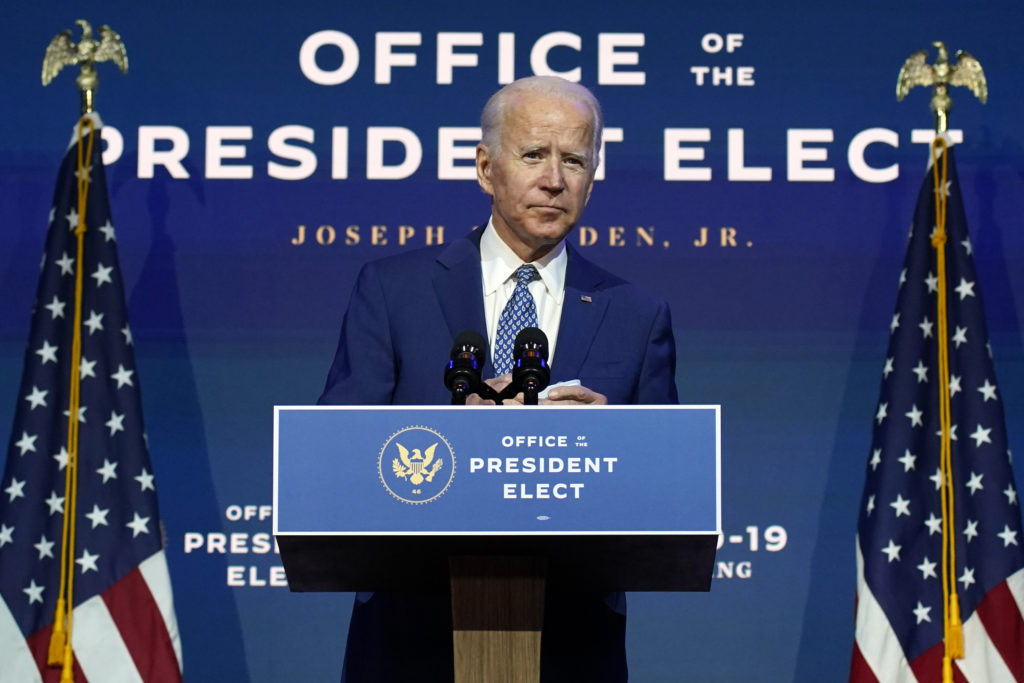
President-elect Joe Biden wants to “restore the soul of America.” First, he’ll need to fix a broken and divided Congress. Biden is rushing headlong into a legislative branch ground down by partisanship, name-calling and, now, a refusal by some to acknowledge his win over President Donald Trump. Democratic allies, struggling to regroup after their own election losses, harbor deep divisions between progressive and moderate voices. Republicans, rather than graciously congratulating the incoming president, are, intentionally or not, delegitimizing Biden’s presidency while catering to Trump’s refusal to accept the election results. At a time when the country needs a functioning government perhaps more than ever to confront the crises of COVID-19, a teetering economy and racial injustice, Washington is being challenged by the president-elect to do better than it has. It’s going to be a hard opening. “The country used to want gridlock because they saw gridlock as a way to protect them. Now the country’s actually hungry for action and progress,” said Jesse Ferguson, a Democratic strategist. “That’s a mandate to flip the switch.” The idea of a Biden mandate, though, is relative, certainly embraced by Democrats who want to push ahead with his agenda. Emboldened Republicans, though, who didn’t lose a single House seat, but in fact expanded their ranks and brushed back many Senate Democratic challengers, see their own mandate to serve as a block on a Biden agenda. California Rep. Kevin McCarthy, the House’s Republican leader, said the election “was a mandate against socialism,” stepping up the relentless GOP attacks, even though Biden is a centrist Democrat. Biden comes to the presidency like few in recent history, with a rare mix of experience but also a potentially divided Congress. Not since President George H.W. Bush has the White House had an executive with such a deep Washington resume. Rarely in modern times has a Democrat started an administration without a full Democratic Congress. While the House is in Democratic hands, the Senate remains undecided, a 50-48 lead for Republicans heading into a Jan. 5 runoff for two seats in Georgia that will determine party control. Asked this past week how he will be able to work with Republicans if they aren’t acknowledging his victory, Biden said, “They will.” What Biden is presenting is a new normal in Washington that he said voters demanded from the election. “If we can decide not to cooperate, then we can decide to cooperate,” he said at his election victory speech. Much has been made of Biden’s relationship with Capitol Hill, where he served as a senator for 36 years, particularly his deal-making as Barack Obama’s vice president with Senate Republican leader Mitch McConnell of Kentucky. Yet McConnell has not revived that approach as he enables Trump to delve into a legal battle rooted in unfounded allegations of voter fraud, even as state officials say the elections ran smoothly and there is no widespread evidence of fraudulent voting. McConnell won his own reelection in Kentucky. Whether McConnell emerges in the new Congress as majority or minority leader with a narrowly divided Senate, the longest serving Republican leader in history will have great leverage over legislation that arrives on Biden’s desk. Biden could seek a repeat of Newt Gingrich’s era when the Republican House speaker served up legislative victories for President Bill Clinton, infuriating Democrats with conservative budget and welfare bills but helping Clinton win a second term. Or Biden could find McConnell rerunning his politically charged GOP blockade of Obama’s agenda. Hopes of overcoming McConnell by ending the Senate filibuster, which would allow bills to advance on a simple majority rather than a 60-vote threshold, are slipping out of reach without Democratic control. “Gingrich insisted the American people wanted it,” said Rick Tyler, a former Gingrich top aide who left the Republican Party in the Trump era. He said McConnell will move on Biden’s agenda when Biden has the nation behind him. “That’s how you do it. Let’s see if Biden can do it,” he said. But it’s not just McConnell. House Speaker Nancy Pelosi, D-Calif., Senate Democratic leader Chuck Schumer of New York and even McCarthy will have oversize roles because of the changed makeup of the new Congress. Biden faces a restive liberal flank, powered by a new generation of high-profile progressives including Rep. Alexandria Ocasio-Cortez, D-N.Y., They helped deliver his victory and may not be so eager to compromise over health care, climate change, income inequality and racial justice issues that have growing popular support. At the same time, while Pelosi and Schumer have long histories with Biden, McCarthy is close to Trump, who is expected to hold a heavy influence on Republicans even after he leaves office. With a slimmer majority in the House, McCarthy’s ability to wrangle votes suddenly matters. “They can, but will they?” said Jim Kessler, a former Schumer aide and executive vice president at the center-left Third Way think tank. “This is a real veteran group of people. They know how to get things done. They know how to stop things from getting done.” An early test for Biden will be the Cabinet nominations, which can be approved by a slim 51 votes in the Senate. Republicans can also block nominees with time-consuming procedural hurdles that could quickly stall the new administration if top positions go unfilled. Democrats did as much to Trump, in some ways as payback after McConnell blocked Obama’s Supreme Court nominee Merrick Garland. “I think there’s a likelihood that Mitch McConnell will Merrick Garland every single Cabinet nominee and will force Joe Biden to negotiate on every single one,” said Sen. Chris Murphy, D-Conn. “Trump is still going to be running the Republican Party. And so, in reality, Joe Biden may have to negotiate every Cabinet pick with Donald Trump.” Republished with the permission of the Associated Press.


